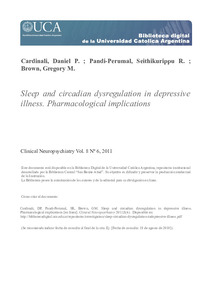Por favor, use este identificador para citar o enlazar este ítem:
https://repositorio.uca.edu.ar/handle/123456789/1658| Título: | Sleep and circadian dysregulation in depressive illness : pharmacological implications | Autor: | Cardinali, Daniel Pedro Pandi Perumal, Seithikurippu R. Brown, Gregory M. |
Palabras clave: | SUEÑO; MELATONINA; RITMO CIRCADIANO; DEPRESION; ANTIDEPRESIVOS | Fecha de publicación: | 2011 | Editorial: | Giovanni Fioriti Editore | Cita: | Cardinali, D. P., Pandi-Perumal, S. R., Brown, G. M. Sleep and circadian dysregulation in depressive illness : pharmacological implications [en línea]. Clinical Neuropsychiatry. 2011, 8 (6). Disponible en: https://repositorio.uca.edu.ar/handle/123456789/1658 | Resumen: | Abstract: Circadian rhythm abnormalities, as shown by sleep/wake cycle disturbances, constitute one the most prevalent signs of depressive illness, advances or delays in the circadian phase, or changes in rhythms' amplitude, being documented in patients with major depressive disorder (MDD), seasonal affective disorder or bipolar disorder. The disturbances in the amplitude and rhythm of melatonin secretion that occur in patients with depression resemble those seen in subjects with chronobiological disorders, thus suggesting that a link between chronobiological disturbances and depressed mood exists. Studies testing variants of genes that control the circadian system have reported circadian gene polymorphisms in depressive illness. Although many antidepressants such as the tricyclics, monoamine oxidase inhibitors, serotonin-norepinephrine reuptake inhibitors, several serotonin receptor antagonists and selective serotonin reuptake inhibitors (SSRIs) have all been found successful in treating depression, their use is often associated with a disruptive effect on the sleep/wake cycle. SSRIs, currently the most widely prescribed of the antidepressants, are well known for their exacerbation of insomnia. The recently introduced melatonin agonist and selective serotonin antagonist antidepressant, agomelatine, which has melatonin MT1 and MT2 receptor agonist and 5-HT2c antagonist properties, has been useful in treating patients with MDD. Its rapid onset of action and effectiveness in improving the mood of depressed patients has been attributed to its ability to improve sleep/wake cycle quality. Thus, current conceptualization of depressive illness needs to be expanded to include the role of circadian dysregulation in the development of the disease. | URI: | https://repositorio.uca.edu.ar/handle/123456789/1658 | ISSN: | 1724-4935 | Disciplina: | MEDICINA | Derechos: | Acceso Abierto | Fuente: | Clinical Neuropsychiatry. 2011, 8 (6) |
| Aparece en las colecciones: | Artículos |
Ficheros en este ítem:
| Fichero | Descripción | Tamaño | Formato | |
|---|---|---|---|---|
| sleep-circadian-dysregulation-indepressive-illness.pdf | 4,3 MB | Adobe PDF |  Visualizar/Abrir |
Visualizaciones de página(s)
145
comprobado en 30-abr-2024
Descarga(s)
136
comprobado en 30-abr-2024
Google ScholarTM
Ver en Google Scholar
Este ítem está sujeto a una Licencia Creative Commons

